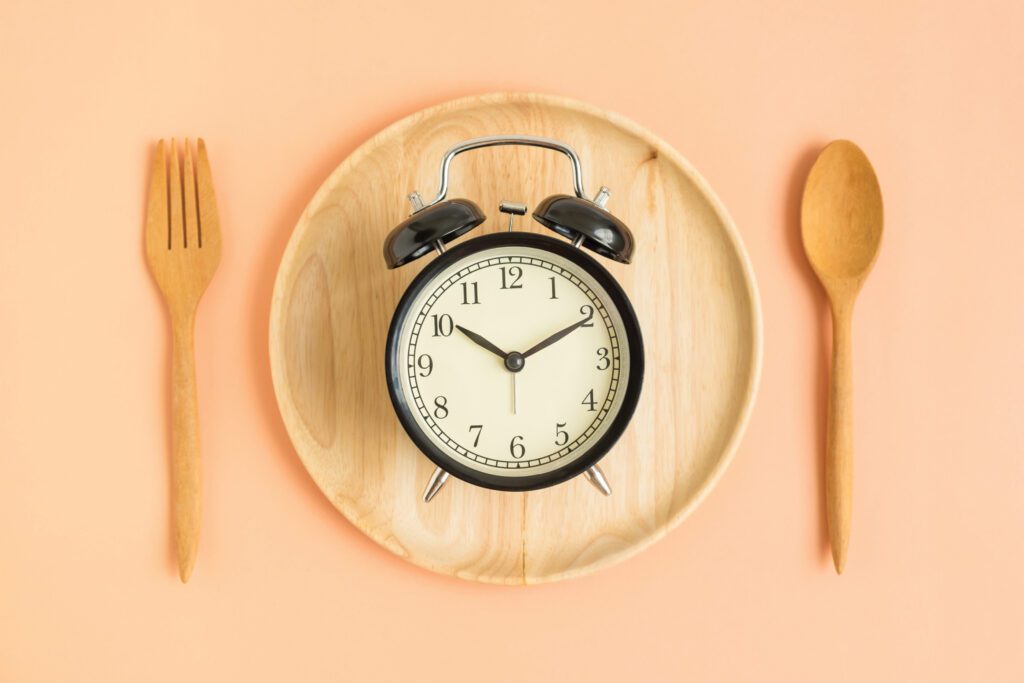Many of us have heard that a high metabolism is good, a low metabolism is bad, and there are ways to manipulate your metabolism to lose or gain weight. The truth is, our metabolisms are a bit more complicated than that. Here, we’re clearing up 7 common metabolism myths.
Simply put, metabolism is the rate at which our bodies break down the food we eat and convert it into energy. This energy is responsible for maintaining our internal temperatures, helping us grow, and allowing us to reproduce.
While many people think of metabolism as the process of burning calories, that’s only half true. Metabolism can be broken into two separate categories: catabolism (destructive metabolism) and anabolism (constructive metabolism). Catabolism – the burning calories part – involves breaking down the food we eat into simple molecules.


This process releases energy that fuels anabolism. Anabolism uses this fuel to build the simple molecules into more complex molecules like carbohydrates, proteins, and fats that run our bodies’ processes. These two processes complement each other to keep our bodies running efficiently.
Food consumption serves as the one and only source of energy intake into the body, but our metabolic rate, or how efficiently our bodies break down calories and use them, is driven by three different energy expenditures. The first is the resting metabolic rate, also called the basal metabolic rate. This refers to the calories your body burns while at rest, and it accounts for 60-80% of your caloric burn each day. Physical activity serves as the second source of energy expenditure, and food digestion is the third and final way our bodies release energy.
Seems easy enough, right? Not necessarily – our metabolic rates clearly affect our weight and well-being, but common misconceptions continue to cloud our understanding. We shed light on some of the most familiar fallacies.
Myth #1: You Have No Control.
It’s true that your metabolism is related to your genetics. In fact, your age, sex, and body composition (height, weight, amount of lean muscle vs. fat) have a significant effect on how you burn calories. For instance, men burn more calories than women of a comparable age and body composition because they generally have more lean muscle and less fat. With that being said, you do have a metabolic range you can control.
Increasing muscle mass boosts basal metabolism because muscle is more active than fat, burning seven to 10 calories per pound daily versus two to three per pound of fat. “Your metabolic rate is directly related to your muscle mass,” says Dr. Medam. “So the more muscle you have, the better metabolic rate you will have.” This can explain how two people can be the same size yet may consume different numbers of calories. The person with more muscle may have a higher basal metabolic rate.
Myth #2: A “Slow” Metabolism Prevents Weight Loss.
When people refer to “fast” and “slow” metabolisms, it’s usually to describe why some seem to eat anything without gaining a pound, while others merely look at food and gain weight.
According to the Mayo Clinic, a slow metabolism is rarely the cause of weight gain. There are medical conditions (like Cushing’s syndrome and hypothyroidism) that slow the body’s natural metabolic process and can cause weight gain, but as a general rule, the ratio of food and drink consumption to physical activity will determine your weight. “It’s easy to blame weight gain on metabolism, but ultimately, the number of calories you eat compared to the energy you expend will equal net weight gain or net weight loss,” says Dr. Medam.
Myth #3: Certain Foods and Drinks Heat Up Your Metabolism.
It’s been said that eating hot peppers and drinking coffee and green tea can elevate metabolism and boost weight loss. Research suggests that spicy foods and hot drinks raise internal temperatures and can slightly increase your energy expenditure, but this uptick is short-lived and almost negligible.
A better way to boost your metabolism through food is by eating a balanced diet that’s high in protein and low in fat and carbohydrates. To break down complex carbohydrates and protein, your metabolism must work harder and longer, burning more energy than it would to break down sugars or simple carbohydrates.
A diet higher in protein will leave you feeling fuller longer and will reduce cravings for snacks and other foods. Also, spicing up your diet with capsaicin (found in chili peppers and hot sauce) can make you feel full and satisfied. Plus, natural foods with capsaicin have been said to boost overall longevity with antioxidant, anti-inflammation, anti-cancer, and even antimicrobial benefits.
Myth #4: Everything Eaten After 8 P.M. Turns to Fat.



Your metabolism doesn’t turn into a pound-packing Gremlin by night. Weight gain is based on the total number of calories consumed, not when you consume them. The 8 p.m. rule is so prevalent because that time of night is known for mindless snacking in front of the television. If you’re truly hungry at night, don’t be scared to satiate those hunger cues! Just rely on healthier snacks, including a high-quality protein, to fill you up.
Myth #5: Eating Six Small Meals a Day Increases Your Metabolism.
Eating six small meals is not necessarily a better alternative to eating three square meals a day.
Eating increases your metabolic rate proportionate to the number of calories you consume, which means six small meals throughout the day will give your metabolism the exact same boost as three large meals. Plus, portion sizes can be difficult to manage. More meals could translate to more calories.
While the way you eat can have a correlation to weight gain (eating too much too quickly before your brain signals fullness), skipping breakfast or eating late does not increase the risk of gaining weight. Bottom line – it’s not when you eat, but what you eat.
Myth #6: Extremely Low-Calorie Diets Jumpstart Weight Loss.
Burning more calories than you consume results in weight loss, but don’t cut yourself short. Eating too few calories a day for an extended period of time can throw your body into starvation mode, where your body holds on to fat storage as a means of survival. Dr. Sanborn explains, “When you don’t consume enough calories to maintain your weight, your body will increase the hormones that make you hungry. It will also consume muscle over fat, because your body is trying to conserve calories to keep your weight the same.”
Ultimately, when you lose weight through crash dieting, your metabolism slows because you are losing lean muscle mass. Since severely slashing calories is unsustainable in the long run, you put yourself at risk of doing more harm than good.
Myth #7: As You Age, Your Metabolism Slows.
While your metabolism can change throughout your life, age alone isn’t to blame. “There is some slowing as you age, but that’s because there tends to also be a decrease in lean body mass as you age,” says Dr. Sanborn. Schedules become hectic, and gym visits may become fewer and far between, which can result in a loss of muscle. This, in turn, lowers your basal metabolic rate, meaning you have to work harder to burn the same amount of energy you once did. Conversely, if you continued to exercise in your 50s at the same rate you did in your 20s, your metabolism would remain consistent.
Mounting obligations can take a toll on the body. Stress and lack of sleep can lead to weight gain, and both trigger a tendency to overindulge in comfort foods and forego the gym. A quick workout can lift lethargy and point your metabolism in the right direction.
At the End of the Day
What counts is the quality and amount of food going in and energy going out. There are no shortcuts to increasing your metabolism, but that doesn’t have to get you down! The good news is that you can always make adjustments. Work toward a more balanced diet and focus on adding muscle-building exercises into your routine to increase the rate you burn calories at rest.



Dr. Guru Medam
Family Medicine Physician, CHI Memorial Internal Medicine Associates – Chattanooga



Dr. Christopher Sanborn
Bariatric Surgeon, Erlanger Bariatric and Metabolic Surgery Center

